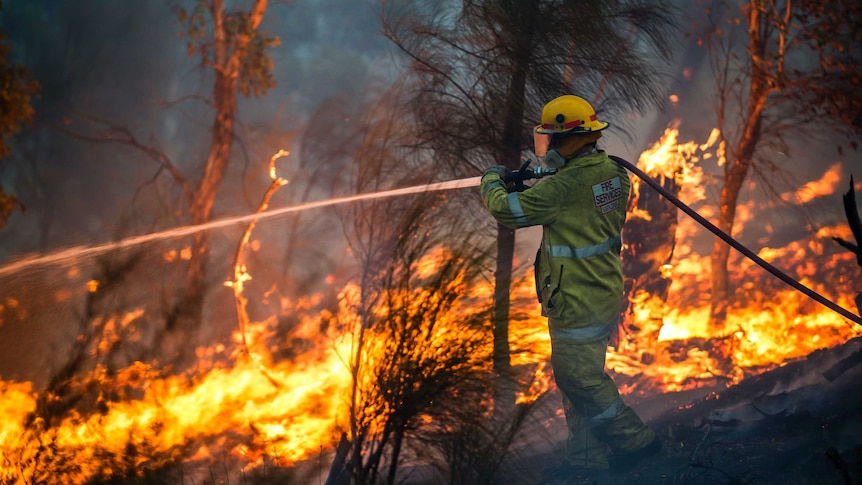I think for what the Rural Fire Service does they should be paid, what kind of first world country do we live in where we don’t pay all of our emergency services
I don’t know how a volunteer-based system is going to be sustainable as climate change worsens.
If we pay people to dig up and burn the shit that got us into this mess, we should definitely be paying the people who deal with the consequences.
deleted by creator
How about we use all those soldiers doing nothing, waiting for the next bogus war to start?
If you don’t think we will need the defence force, especially since we’re apparently just going to go “fuck it roll them die” on our future with global warming, you are sorely mistaken.
If our defence force is fucking around doing the job of emergency firefighters, because the government thinks having volunteer firefighters is appropriate, how do you think that will affect their combat readiness? With Russia invading Ukraine, China flying military aircraft towards and the planet on the verge of becoming uninhabitable; there will be plenty of chances for wars that aren’t “bogus” to emerge.
This is silly. They can help between training assignments. It’s not one or the other
Very true. Plenty sitting around who could be on assignment in places that matter
“Between assignments” and “plenty of sitting around” shows me neither of you have any concept of the roles of any military let alone the ADF and any further discussion would not be an effective use of my time.
No, what I know is every one of my army buddies got sent into the middle of the fucking desert to work on HVAC units.
Stop acting like bases in the middle of bumfuck nowhere are somehow important when the people stationed there LITERALLY refer to their work as sweeping sand in a sandstorm.
If you think that anecdotal story somehow justifies the idea of using the military to fight fires, I don’t know what to tell you. The fact the military has dudes who’s literal job it is to fix HVAC because the air con dying would fuck with operational readiness. How do you think having random amount of your service members tied up fighting fires would affect that readiness. It’s a ludicrous idea that doesn’t pass any test based in basic common sense.
The whole hurry up and wait shit was because the US military valued its readiness and would rather have people standing around ready to go rather than the inverse situation. Especially since the amount of bushfires are predicted to increase and the fact that most militaries have area of denial weapons specifically to set large areas of land on fire… I don’t know what else I can say to make you see what a shit idea it is.
nah mate, i know plenty of ADF people and its all ‘busy’ work. im all for keeping them combat ready by the way, but training them to assist in fighting fires does seem like a win win, when the capacity is there
is there any provisions for leave? eg extra days off where the govt compensates your employer or anything like that? the only RFS people i know are self employed and work their own farms independantly so im not sure about that
I know the Australian Public Service issues specific leave for firies; I imagine the state and territory governments do similar
Unpaid fire brigades work okay if fires are few and far between, but you can’t ask people to take months off work every year. Firefighters still need to eat.
Interesting that you guys seem to do it pretty much like Germany in this regard - most firefighters in Germany are also unpaid volunteers.
In most cities of any appreciable size we do have paid forces, it’s rural areas and very small cities that generally have volunteer forces. I agree though that they should all be compensated, they sure as hell deserve a salary for their work more than I do mine
The work has real value, no question about that. But there are problems with paying RFS or the like for fighting fires.
You introduce the profit motive into a situation where there is no clear beneficiary to charge. This is a tragedy of the commons situation. It means the only reasonable payer is a government. What government is introducing a large new cost to an already large fiscal budget each year if they don’t have to?
The profit motive can also lead to distortions in the actions of market participants. That may not lead to desirable outcomes for defending, or not defending locations against fires.
For example - By introducing the system of exchange for fire fighting you could actually increase the risk of fires being lit therefore increasing the budgets of certain bad faith actors. An example of manufactured demand.
There are benefits of the current volunteering system. By its nature of being ouside the system of exchange, and being within the system of ‘bequeath in good faith’. For example - This dimishes the demands for service delivery down to match the relatively unpredictable nature of fires.
The issue of interest should actually be, why volunteerism rates are showing a long term downward trend “36.2% in 2010 to 28.8% in 2019” https://www.volunteeringaustralia.org/resources/key-facts/
The system as it is today has benefits that we shouldn’t discount so easily. The problem is the flow of new people into the system is declining when, due to climate change, the rates should probably be increasing.
You could argue that it gives the government an incentive to reduce fire risk through prevention and maybe act on climate change. Perhaps we need a system where they get paid a lucrative amount when they are out fighting fires, risking their lives. I don’t think in the 21st Century we should be exploiting the goodwill of the few for a problem which is very much government driven.
An alternative way to fund them could be in the form of a tax on industries which drive climate change or otherwise increase fire risk.
The incentives are already there, the cost of these services and the clean up already falls largely on the government in all but workers (volunteers) and insurance.
Governments aren’t going to act on climate change if their parliamentarians are voted in on the basis that they don’t care about it as an issue. If they do care about it, they are already taking action, but big boats don’t turn quickly, and Aussie energy usage is a very big boat.
The ‘system’ doesn’t need to change, it needs fixing and support. As I said, if you introduce the system of exchange, ie money, there can be undesirable effects. The idea you present is a great example. “get paid a lucrative amount” is exactly what you don’t want.
Lights and sirens is already enough to attract some people, who often join fire services, to light fires themselves. By the lucrative pay idea, you add an extra incentive for unscrupulous firefighters to go light a fire.
“Exploiting the goodwill of a few”, I think you’d struggle to find many volunteer firies who feel exploited, in the pejorative sense.
A volunteer system arises where there is need in the community for the community. In this situation it is ‘each to the best of their abilities, in the situation they find themselves in’.
An exchange system (money), or hierarchical system (military), can be cumbersome. But a community working together with the right tools and training (our current system), is able to tackle a problem quicker and more effectively, local knowledge is also a big advantage. The community under fire risk has the highest incentive as an entity to protect themselves.
“Very much government driven” I’d argue its wealth driven. The wealthier someone is in a current system the less likely they’ll want change.
“Tax on industries” Labor tried it a decade ago, (after all a tax is simply a cost increase for reason X). It showed signs it was working. Abbott axed it. No ones gone there since. It is still the most cost effective way to tackle climate change.
Sorry for the essay.








